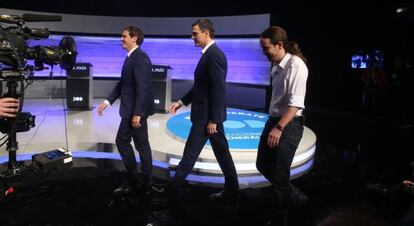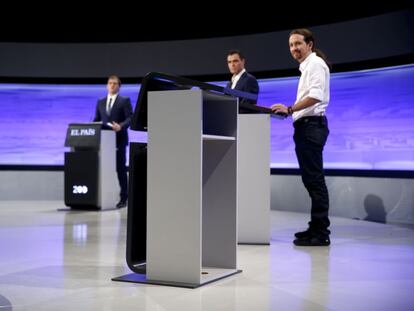The EL PAÍS Debate consolidates options for change in Spanish politics
The candidates aspiring to replace PM Rajoy swap views on jihadism, the economy and more The lively encounter features bitter confrontations but also a new tone and style

The three main candidates aspiring to replace Prime Minister Mariano Rajoy at the December 20 election faced off against one another on Monday night in a debate that was the first of its kind in several ways.
Organized by EL PAÍS, it was the first Spanish election debate to be broadcast online rather than via television. The format also involved a break with the past, with contenders accepting questions from the audience for the first time.
The picture that emerged was one of changing political styles in a country where politics has been dominated by the same two parties since the 1980s
Pedro Sánchez of the Socialist Party (PSOE), Albert Rivera of Ciudadanos and Pablo Iglesias of Podemos discussed jobs, welfare policies, territorial issues and political reform for nearly two hours. Popular Party leader Rajoy was conspicuously absent from the debate after declining EL PAÍS’ invitation and attempting to send his deputy instead.
While there were moments of bitter confrontation, analysts agreed that there was a new tone and body language on display, including the fact that candidates addressed each other by their first names and used the familiar tú rather than usted.
This new style is partly attributable to the candidates’ youthfulness – Rivera is 36, Iglesias is 37 and Sánchez is 43, while Rajoy is 60 – and also to the fact that they are relative newcomers to national politics: neither of them has run in a general election before.
Both Iglesias and Rivera portrayed themselves as champions of Spain’s new politics and cast Sánchez as part of the old system
The picture that emerged was one of changing political styles in a country where, until now, politics has been dominated by the same two parties since the 1980s, while voters felt a growing gap between themselves and their representatives.
As for their strategies, both Iglesias and Rivera banked on their position as leaders of emerging parties to portray themselves as champions of Spain’s new politics and to cast Sánchez as part of the old system.
Both tried to identify the PSOE with the PP, and attributed many of today’s problems to the former Socialist administration of José Luis Rodríguez Zapatero, who was in office when the economic crisis hit Spain.
But Sánchez presented himself as the representative of the party that has ruled Spain the longest and built the welfare system. “We Socialists are the architects of the welfare state,” he said.
Iglesias said he would hold a national referendum on military action in Syria
Meanwhile, both Sánchez and Iglesias sought to present Ciudadanos as a right-wing option, while Podemos was often made out to be a far-left choice by the other two nominees.
“No constitution enshrines the right to self-determination, except the Soviet Union’s, which is your model, Pablo,” said the Socialist candidate when talk turned to the separatist challenge in Catalonia.
“That’s the argument used by the right-wing media,” responded Iglesias, who cited the Scottish independence referendum.
Regarding the fight against global jihadism, the Ciudadanos and Socialist candidates expressed a willingness to contribute to military action in Syria if it is greenlighted by Spanish Congress. Iglesias, however, said he would hold a national referendum to see what Spaniards think about the matter.
The subject of democratic reform triggered the harshest attacks among the nominees, who reminded one another of their shortcomings on corruption
On the economic front, Rivera proposed a unified contract for all workers to reduce steep inequalities in job conditions, a reform of the rules governing self-employed workers to encourage entrepreneurship, and lower income tax.
Podemos’s Iglesias talked about fighting tax fraud, lowering VAT, taxing financial transactions and changing Spain’s production model, which should be increasingly based on renewable energies.
The Socialist candidate pledged to undo the entire labor reform introduced by the PP and to protect those long-term unemployed who no longer qualify for welfare checks.
But it was the subject of democratic reform that triggered the harshest attacks among the nominees, who reminded one another of their shortcomings on the corruption front.
“Those who got us into cases such as Púnica or the ERE in Andalusia cannot free us from corruption,” said Iglesias, in reference to two major graft probes involving the PP and the PSOE, respectively.
Sánchez attacked Ciudadanos for allowing the PP to retain control of the Madrid regional assembly following the May elections, despite the numerous corruption cases affecting the conservatives there.
English version by Susana Urra.
Tu suscripción se está usando en otro dispositivo
¿Quieres añadir otro usuario a tu suscripción?
Si continúas leyendo en este dispositivo, no se podrá leer en el otro.
FlechaTu suscripción se está usando en otro dispositivo y solo puedes acceder a EL PAÍS desde un dispositivo a la vez.
Si quieres compartir tu cuenta, cambia tu suscripción a la modalidad Premium, así podrás añadir otro usuario. Cada uno accederá con su propia cuenta de email, lo que os permitirá personalizar vuestra experiencia en EL PAÍS.
En el caso de no saber quién está usando tu cuenta, te recomendamos cambiar tu contraseña aquí.
Si decides continuar compartiendo tu cuenta, este mensaje se mostrará en tu dispositivo y en el de la otra persona que está usando tu cuenta de forma indefinida, afectando a tu experiencia de lectura. Puedes consultar aquí los términos y condiciones de la suscripción digital.









































